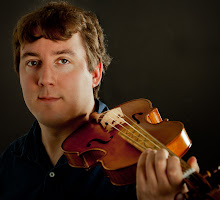Next, I found a recording of Janine Jansen playing Bach's Chaconne, arguably the greatest piece of music for solo violin, or any medium, ever; her playing is extremely beautiful, even though not very baroque, but some guy had made a comment referring to the piece as a "song". This particular word gets my gander up when it comes to classical instrumental music, so I wrote back saying "The song? I wasn't aware the Chaconne had words." To which the original guy replied "Wow, you are impertinent." Sweet.
My personal favourite, though, has to be the following: last night I found a recording of Bach's beautiful aria from the St. Matthew Passion, "Erbarme dich", which has a stunning violin obbligato line throughout. It's about as beautiful an aria as you can get. This recording (Richter, with Julia Hamari singing) is not what I call beautiful though, unless lying naked and being covered with two truckloads of sonic maple syrup is what you're into. All the notes are there, it's all in tune, but it's still awful. All the notes are equally important, super-vibrated, and there's no sense of it being based on the siciliano dance form. The person who posted the video wrote "It goes deep into your soul. No words. Just watch, listen and get out of this world." So I wrote "You're right. This does take me to another world. A world filled with boredom." Because in the words of Nigel North, my esteemed Baroque Performance Practice professor, "all performers do actually express an affect successfully, even if it's mostly boredom".
The epic reply I got to this comment is also out of this world. Here it is word for word:
"So I recommend you to comb a lion mane or brush a crocodile teeth. You can be sure that you will not be bored at all if you do that. It is a wrong place to you here."
